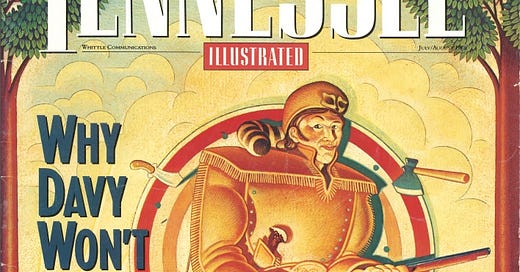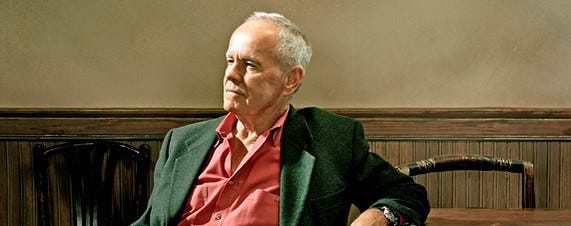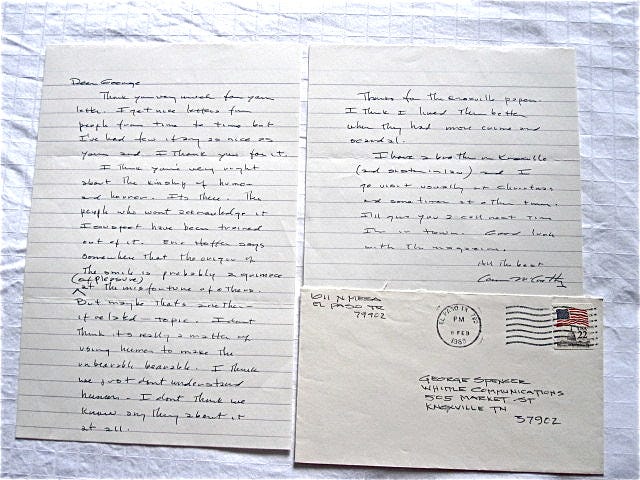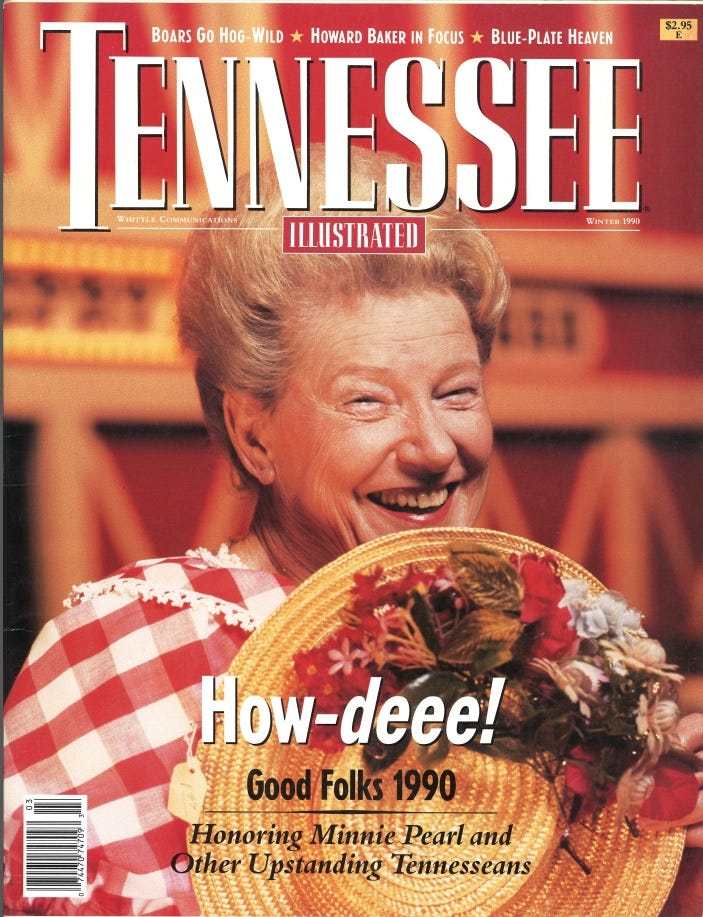When Cormac McCarthy Wrote Me
The great writer shared his views on the connection between horror and humor.
Cormac McCarthy and I traded letters 35 years ago in February and June 1988. I was an Editorial Director at the Time Inc. subsidiary Whittle Communications in Knoxville, Tennessee. Its chairman Chris Whittle had asked me to lead a team to create, launch, and run a new magazine about Tennessee. (Chris wanted to be governor of Tennessee. He hoped a state magazine would boost his name recognition in far-off Memphis and Nashville.)
We created Tennessee Illustrated, a hybrid of LIFE Magazine and Texas Monthly. Imagine a publication so big it dominated coffee tables. It showcased stellar illustrations and photography. It profiled luminaries like Alex Haley, Senators Al Gore and Howard Baker, Al Green, Rosanne Cash, and Congressman David Crockett. It ran articles on rural health care, economic development, undercover drug stings, toxic waste dumps, capital punishment, cockfighting, spelunking, and wild boars. (They run wild in the hills where they eat small children and otherwise ruin the environment.)
I wanted our writers to be Tennessee’s best, people like former Rolling Stone reporter Chet Flippo who lived in Knoxville and historian Hampton Sides, a Memphis native.
The magazine would publish new fiction, too. I made a list of novelists who had either been born in the Volunteer State or had long-standing ties to it.
At the top of the list—Cormac McCarthy. He grew up in Knoxville. He set most of his early work there, in the local hills, or in some mythic-seeming world that reminded me of Appalachia.
This was before the publication of All the Pretty Horses, the novel that brought him acclaim. While climbing the Tennessee Illustrated learning curve, I read most of his books. Suttree, a comic picaresque about Knoxville lowlifes, did for that city what Ulysses did for dear, dirty Dublin. Outer Dark recounted the rural wanderings of a apparently pioneer-era teenage brother and sister who had committed incest. Child of God told the tale of a cave-dwelling murderer. Blood Meridian tracked blood-crazed Southwestern marauders. Now regarded as his masterpiece, it was out-of-print. Moby Dick also went out of print during Melville’s lifetime. That’s just how popular Cormac McCarthy was when I wrote him.
McCarthy struggled so long and so hard to be recognized that in 1989, a year after we corresponded, he wrote a friend “I’ve been a full-time professional writer for 28 years, and I’ve never received a royalty check. That, I’ll betcha, is a record.” He had never even had an agent.
I thought McCarthy was better than Faulkner. I could read—and enjoy—his fiction. You need a machete and a decryption machine with 12 dials to hack through Yoknapatawpha. McCarthy’s lucid yarn spinning and lean way with words astonished me. I thought he was better than pretty much anybody else, except my literary hero the mild-mannered novelist and essayist E.B. White.
I got McCarthy’s address from his editor. I wrote to him asking if he would share some of his new and unpublished work with the magazine or if he would write something original for me.
McCarthy loved all things ghoulish and ghastly. What fascinated me was that he wrote about them with a twinkle and a grin. I wanted to plumb the wherefore of that with him. I have lost my letters to him, but here are his handwritten replies with his punctuation and paragraphing intact.
First Letter:
Dear George
Thank you very much for your letter. I get nice letters from people from time to time but I’ve had few if any as nice as yours and I thank you for it.
I think you’re very right about the kinship of humor and horror. Its there. The people who wont acknowledge it I suspect have been trained out of it. Eric Hoffer says somewhere that the origin of the smile is probably a grimace of pleasure at the misfortune of others. But maybe thats another - if related - topic. I dont think its really a matter of using humor to make the unbearable bearable. I think we just dont understand humor. I don’t think we know any thing about it at all.
Thanks for the Knoxville papers. I think I liked them better when they had more crime and scandal.
I have a brother in Knoxville (and sister in law) and I go visit usually at Christmas and sometimes at other times. I’ll give you a call next time I’m in town. Good luck with the magazine.
All the best,
Cormac McCarthy
Second Letter:
Dear George Spencer
Sorry to be so long in answering your nice letter. About the only way I can manage it is just to take a couple of days every few months and at least answer some mail. I appreciate the photos also. Some familiar landmarks there. The one of the river left me unsure of whether I was looking toward the north bank or the south. Is that a paddlewheel boat?
The incident about the boxing ape happened to a friend of mine - Billy Rhodes - now dead I’m sorry to say. I wish I could have told it as well as he did. Thank you for the nice comments on books by CM. I am working on a couple of books but I doubt I’ll have anything in any sort of finished state in time for your magazine. I don’t do anything really but write novels and dont ever have short pieces except as someone might excerpt from a book occasionally. Maybe at some later date I’ll have a book done that you can pick something from before publication. I think the magazine sounds like a good one and I hope it gets the support it needs. Thanks again for writing. All the best
Cormac McCarthy
Alas, McCarthy never contributed to Tennessee Illustrated. I should have written him a third letter. For the want of a nail.
The magazine folded three years later. Despite Chris Whittle’s gifts as a salesman and marketer, he never became governor. Or senator. Or President of the United States. That was his aim. Blinded by hubris, he soon met his nemesis in the form of financial ruin. His company collapsed. He left town.
Unlike my boss, Cormac McCarthy’s dream came true. He had courage. He refused to give up even after three decades of commercial failure. He was persistent. He had faith in himself and in his talent. He wanted to create art that would endure. Most of all, he was humble. Nose to the grindstone where horror meets humor, he became one of the best writers ever.
For stories similar to this one, buy my book Courage 101: True Tales of Grit & Glory.









So conversational are McCarthy's letters that when I read them it's like he's in the room (or at the bar) with you (and me).
Your article brings back some great memories of Tennessee Illustrated, George. As I'm sure you know, McCarthy's favorite book was "Moby Dick." Mine, too. That's about all we had in common. Sorry for the unnecessary punctuation. That's a Cormac no-no.